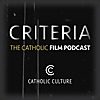
Criteria
65 FOLLOWERS
Discussions of great movies from a Catholic perspective, exploring the Vatican film list and beyond. Hosted by Thomas V. Mirus and actor James T. Majewski, with special guests.
Criteria
1M ago
In 1936, Pope Pius XI published his encyclical on the motion picture, Vigilanti cura. The encyclical deals with the grave moral concerns raised by the cinema, which had by then become a ubiquitous social influence (though it was also a still-evolving medium, as the transition from silent film to talkies had only recently been completed). Pius holds up for worldwide emulation the initiative that had recently taken by the American bishops to influence the motion picture industry in a moral direction, as well as to protect their own flocks from immoral movies.
Vigilanti cura was ghostwritten by t ..read more
Criteria
2M ago
Joshua Hren, editor-in-chief of Wiseblood Books, joins the podcast to review Wildcat, the new Flannery O'Connor biopic directed by Ethan Hawke and starring Maya Hawke and Laura Linney.
The film is a respectful and nuanced portrayal of O'Connor and her faith, accomplished by extensive quotation from her prayer journal and letters, as well as several interludes depicting her short stories (which keeps the film from feeling like a formulaic biopic).
Wildcat's portrayal of the relationship between artistic ambition and faith is deeply relevant to Catholic artists. It should inspire them to fi ..read more
Criteria
3M ago
Thomas and James discuss two classic Hollywood films dealing with the moral problems of overweening ambition - specifically in the context of show business. All About Eve (1950), which won six Oscars and features razor-sharp dialogue and an unforgettable performance by Bette Davis, is set in the world of the theater, while The Bad and the Beautiful (1952) is a (perhaps more honest) self-examination of Hollywood itself. The latter contains the more perceptive observations of artistic genius and its operations, which tend to subordinate everything to the work to be done. More broadly ..read more
Criteria
4M ago
Continuing our trek through the filmography of Terrence Malick, the world's greatest living Christian filmmaker, we arrive at The Thin Red Line (featuring Jim Caviezel in his breakthrough role). This film came in 1998 after Malick's twenty-year hiatus from directing movies, after which he never took such a long break again.
Focused on the experiences of U.S. soldiers during the battle for Guadalcanal during World War II, The Thin Red Line is remarkable in that it features all the poetry, interiority, and dreamy aesthetics we have come to expect from Malick, while still being, in Nath ..read more
Criteria
5M ago
There are many ways to make a movie. Only a few of those ways fit within the Hollywood mold. We believe that rather than taking pop culture as their sole model, Catholics and Catholic filmmakers should be open to a wide variety of artistic approaches. Thus, in this episode James and Thomas discuss the early career of the great Iranian director Abbas Kiarostami, who came up with an approach to filmmaking that is not just different from Hollywood, but different from anyone else in world cinema.
Kiarostami spent the first two decades of his career working for the Center for the Intellectual Devel ..read more
Criteria
7M ago
There must be something in the water – everyone’s talking about the Vatican Film List! Just after the Criteria crew concluded three years going through the list, Word on Fire has published their own book about it, Popcorn with the Pope: A Guide to the Vatican Film List, with essays on all 45 films by David Paul Baird, Fr. Michael Ward, and Andrew Petiprin. The three authors join the show to compares notes with James and Thomas about their overall evaluations of the list, great religious films made by non-religious directors, what makes a good saint movie, and their personal favorite items on t ..read more
Criteria
8M ago
This is the first episode of a series covering the complete filmography of Terrence Malick, who is arguably both the most important Christian filmmaker working today and the most important filmmaker working today, period.
What sets Malick apart from a number of other directors whose work deals with a religious search, is that his films are not just about searching indefinitely with no answer, but they come from the perspective of a sincere believer who actually has a positive proposal about life's meaning.
Some of his best-known movies in which this positive proposal is evident are A Hidd ..read more
Criteria
9M ago
DONATE to make this show possible! http://catholicculture.org/donate/audio
SIGN UP for Catholic Culture's newsletter: https://www.catholicculture.org/newsletters ..read more
Criteria
9M ago
Katy Carl, fiction writer and editor-in-chief of Dappled Things, joins the show to discuss the 1979 film adaptation of Flannery O'Connor's novel Wise Blood, directed by John Huston and starring Brad Dourif.
Links
Katy's short story collection, Fragile Objects https://www.wisebloodbooks.com/store/p136/Fragile_Objects%3A_Short_Stories_by_Katy_Carl.html
Dappled Things https://www.dappledthings.org/
SIGN UP for Catholic Culture's newsletter: https://www.catholicculture.org/newsletters
DONATE at http://www.catholicculture.org/donate/audio ..read more
Criteria
10M ago
Introducing a director you almost certainly haven't heard of - but who is well worth getting to know. Lijo Jose Pellissery is one of the major artists of a new movement that has developed over the last decade in the Malayalam film industry - that is, the cinema made in Kerala, the region where India's Christians have lived for many centuries.
All of Pellissery's films are set within Indian Catholic or Orthodox communities. Indeed, while the director is clearly influenced by Western movies, much of his films' vitality comes from how regionally rooted they are, not just in Kerala but even in spe ..read more